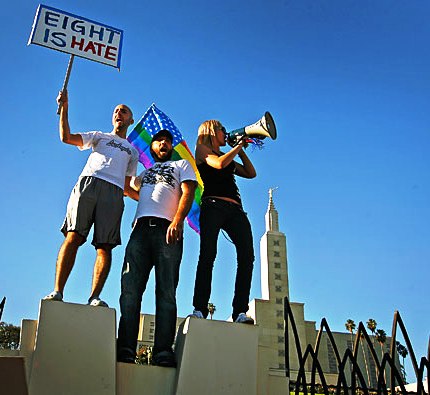I hope you can stand at least one more post on Proposition 8 and its aftermath.
I decided to bag the post I had planned because this issue or at least the reaction to the passing of Proposition 8 in California seems to have some longer range consequences. As a California native who lived the great majority of my life there (until I moved to Colorado 5 years ago), I am interested.
1. There has been a strong and sometimes violent reaction to the passing on Proposition 8 by the opponents similar to, but not on the same scale as those during the civil rights struggles. Not riots, but strong protests, mainly at religious institutions and mostly at Mormon Temple sites, Los Angeles, Oakland and San  Diego. I have not heard nor seen any reports on widespread protests at LDS chapels on Sunday. ( CORRECTION: here’s one in Seattle) There was also a large protest at Saddleback Church (Pastor Rick Warren’s Church) in Lake Forest, Ca. Anti-8 folks are angry and frustrated that they did not get what they wanted and are now demonstrating it toward those they feel are responsible for their loss.
Diego. I have not heard nor seen any reports on widespread protests at LDS chapels on Sunday. ( CORRECTION: here’s one in Seattle) There was also a large protest at Saddleback Church (Pastor Rick Warren’s Church) in Lake Forest, Ca. Anti-8 folks are angry and frustrated that they did not get what they wanted and are now demonstrating it toward those they feel are responsible for their loss.
The fact is that while these folks certainly had no love for the Mormon Church prior to the vote, or were at least ambivalent toward it, they were probably like most people in their knowledge of the Church. So their reaction to the well coordinated efforts by its members at the urging of its leaders is probably one of sheer frustration rather than any vendetta that they might personally hold against the Church itself. So, it was, up until now.
It has been pointed out that the Church was one of many involved in the campaign, but again, the most organized of the bunch, it appears. Mormons only represent 2 percent of Californians, so, if all voted for Prop 8, could only be blamed for 2% of the 52% majority. Of course, as we know, not all agreed with the pro 8 position and many church members are too young to vote.
The irony here is that had prop 8 lost, you would not see the kind of protests from the frustrated pro 8 folks.
2. There is also an irony involved as you watch the videos that Andrew referenced in his post as the protesters shout “Stop the Hate.” There are hateful references to the Church, Christians in general and others who supported Prop 8 because of their belief in traditional marriage but not unkind feelings toward gay people.
Certainly, there are those in religious organizations that “hate” gay people or their lifestyle, but certainly the prop. 8 campaign did not appear to be “hate-filled” but only addressed the issue itself. There were no untoward ads that mocked gay people or spoke of extreme dire consequences of the defeat of prop 8 against a backdrop of sinister music and visuals. I suppose some might argue that some references to the potential acceptance and teaching of the Gay lifestyle in schools and the influence on children might be construed that way, but from my point of view, it was handled respectfully. The anti 8 campaign seemed to be quite the opposite especially at the end. Granted, I don’t live in California any longer so I can’t say that I saw all the ads, but I did see a number of them on YouTube and on the California newspaper websites, which I look at every day.
So, who needs to “Stop the Hate?”
3. The final irony for me is the fact that the polling data seems to indicate that African Americans and Hispanics were the deciding voters who pushed Prop 8 over the top to passage. So, apparently, they did not see this as a civil rights issue. According to the Sacramento Bee, 70% of those identifying their race as Black voted for the proposition while 53% Hispanic/Latino against 49% White and Asian. In spite of the talk to the contrary, it appears to be a morality/societal question, not a question of civil rights.
So, I hope we can all get passed this episode and come to some place where all sides can be satisfied. Perhaps that is not possible, I hope it is. The trend seems to indicate that in a few years, voters will be willing to allow gay marriage, if the demographics are correct as older, more conservative voters are eliminated from the voting rolls and younger, more accepting voters replace them. Of course, it is harder to overturn a constitutional amendment than it is to pass one. And, we don’t know what the courts will do.
So, stand by, this is not over.
